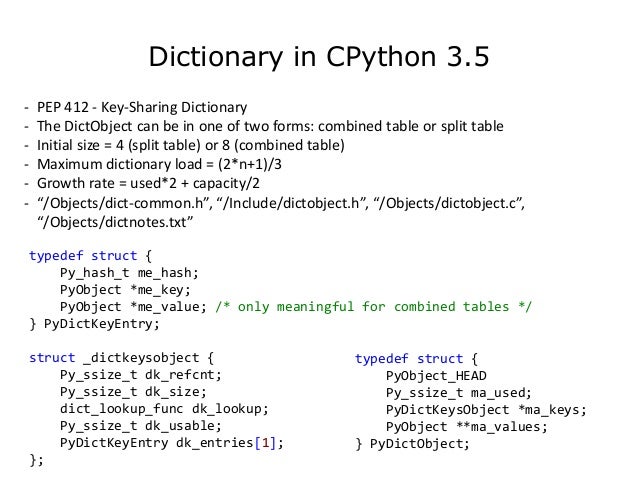C Program To Implement Dictionary Using Hashinger

@Hardell Make sure your hashtable is big enough. A hashtable is expected to have plenty collisions if it is filled by more than 70-80%! If you want to add 100 words, the hashtable should at least have a size of 130 to 140, bigger is better (e.g. If you use modulo (%) to crop the hash to the hashtable size, as you do, there is no need for a power of 2 size. Power of 2 sizes are only needed if you want to use AND ( &) to crop the hash, as AND is several times faster than modulo. – Jan 19 '13 at 19:40 •. @Hardell: I think you somehow have the incorrect belief that good hashtables are supposed to be collision free.
Rather the opposite is true. Even the best hashtable implementations written by the greatest expert in the world do have plenty of collisions when being filled with real life data. This is absolutely unavoidable. And having only two to four collisions per index is a great value, I don't understand why you complain about that. It's rather how you deal with collisions than how you avoid them.
See comments on collisions I added to my answer. – Jan 20 '13 at 22:33. Firstly, I create a hash table with the size of a prime number which is the closes to the number of the words I have to store, and then I use a hash function to find an address for each word.
Hello Everyone, Lets see how to implement a dictionary using C. The main goal of this code is to show malloc in use - dynamically allocating memory to dat structures. C/HashTables Note: You. A hash table is typically used to implement a dictionary. 1 /* implements universal hashing using random bit-vectors in x */ 2.
Return (hashAddress%hashTableSize); Since the number of different hashes is comparable to the number of words you cannot expect to have much lower collisions. Bakemonogatari 1 15 Sub Thai Siwan. Evangelion Episode 24 Download Raw Converter. I made a simple statistical test with a random hash (which is the best you could achieve) and found that 26% is the limiting collision rate if you have #words == #different hashes.
One of the things which I miss while writing programs in C is a dictionary data structure. What's the most convenient way to implement one in C? I am not looking for performance, but ease of coding it from scratch. I don't want it to be generic either -- something like string->int will do. But I do want it to be able to store an arbitrary number of items. This is intended more as an exercise.
I know that there are 3rd party libraries available which one can use. But consider for a moment, that they don't exist. In such a situation what's the quickest way you can implement a dictionary satisfying the above requirements.